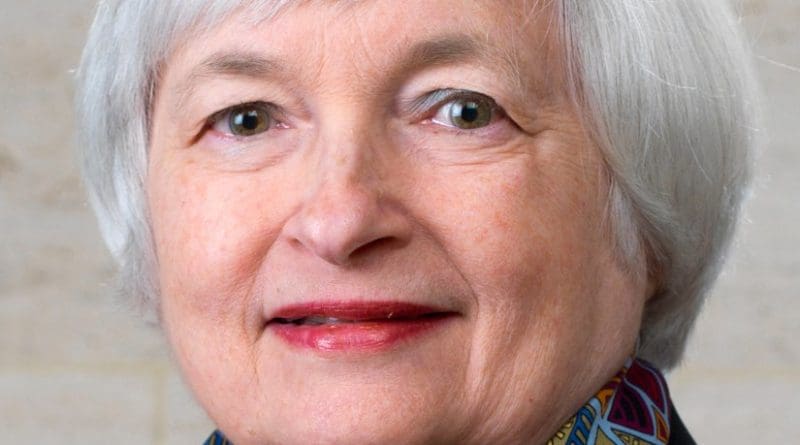Who Will Be Next Fed Chair: Bigger Worry Is Era Of Loose Policy – Analysis
By RSIS
Who will be heading the US Federal Reserve if Chairperson Janet Yellen leaves the office early next year? In any case the concern will be on the possibility of a new era of loose policy, rules and regulations in finance and banking with all the adverse implications.
By J. Soedradjad Djiwandono*
Since the elevation of Donald Trump as President of the United States, people have started to talk about the likely end of Janet Yellen as Chair of the US Federal Reserve. Her four-year term will be up by February 2018. This will be followed later by that of Vice Chairman Stanley Fischer. Her contemporaries like Mario Draghi of the European Central Bank (ECB) and Jaime Caruana of the Bank for International Settlements (BIS) will also be stepping down.
The monetary authorities of advanced economies had commendably steered away from depression after the global financial crisis (GFC) of 2007/08. However, they also faced much criticism for not being as successful in dealing with issues of deflation, prolonged recession and slow and sluggish recovery to the point of endangering their credibility. This has also been experienced by the Fed under Yellen.
Challenge Facing Yellen
The challenge facing Chairperson Yellen is not just to defend the office’s credibility amidst a less predictable environment. In fact, how to steer the US monetary and financial system through an even more unpredictable economic and financial policy environment of the Trump presidency must be challenging indeed.
From what had been reported in the media President Trump started by criticising Yellen during the campaign period, accusing her of being unwilling to change the interest rate so as to help the Democrat candidate. But President Trump’s criticism of Yellen soon ended, giving rise to speculation that there is a possibility that Trump would ask her to continue a second term as Chairperson.
In the meantime, speculation is also growing that President Trump has been grooming Gary Cohn, Head of the White House National Economic Council and former president of Goldman Sachs, to be his choice to succeed Yellen when her first term ends. However, after Cohn revealed his disappointment with President Trump’s handling of the Charlottesville debacle, it is doubtful whether he would still be the president’s choice to head the Fed.
If Cohn’s public statement on his disagreement with President Trump over Charlottesville rules him out for the post, this may similarly happen to Yellen. US central bankers, financial authorities as well as scholars from all over the world recently gathered at Jackson Hole, Wyoming to discuss global issues in finance and banking. This is an annual event for them to discuss current issues and challenges facing central banking.
Lessons of the Crisis
In her welcoming speech Yellen argued strongly for tighter financial rules; she said tighter rules have been instrumental in providing financial stability and robust support for economic recovery and growth. She joined Vice Chairman Fischer to warn the opponents of tighter financial rules to remember the lessons from the global financial crisis (GFC) that was followed by the great recession.
The GFC was triggered by the subprime mortgage loans meltdown in the US in 2007 which spread globally after the US let mega bank Lehman Brothers declare itself bankrupt on 15 September 2018. The US addressed the crisis and its implications by bailing out troubled banks and financial institutions and corporations. The US also introduced tighter regulations and supervision of finance in 2010.
Some rules which have been much criticised by financers for their stringency include the prohibition on banks to invest in their own fund or proprietary trading, known as the Volcker rule, as well as stress testing. These, together with rules for consumer protection, have been criticised as constraining and are stifling the financial institutions in their operation to support recovery and growth of the economy.
During his campaign for the presidency, Trump never failed to criticise the Dodd-Frank Act as stifling financial operation and promised to repeal it. Speculation has been rife that should a former president of Goldman Sachs head the Fed, the plan to repeal Dodd-Frank would be realised.
That has been the argument for Cohn as the successor to Janet Yellen — until Charlottesville broke out. And now with Yellen strongly defending Dodd-Frank, she could be similarly out of the running to head the Fed for a second term in early 2018.
Changing Dodd-Frank Act
There has also been valid criticism of the Dodd-Frank Act for becoming too complex a set of rules, which is difficult to be implemented consistently. The Act as amended is a 2300-page document. So generally, there are some valid reasons to change the regulation to be more implementable, but not to be repealed or to be reduced to the loose regulation of the past, which had contributed to the vulnerability of the financial system, resulting in the global crisis.
So, the focus would be on the Fed after Yellen and Fischer, which most probably would be in the hands of those closer to President Trump’s programme to dismantle the Dodd Frank Act. The aim would likely be to loosen the regulations — with all its implications. These include less rigid rules for banks to expand loans and finance high leveraging, which has been rampant globally, with the implications of higher risks and uncertainties.
Emerging economies are concerned about the Fed and the central banks of other advanced economies increasing their prime rates. Such a repeat of the 2013 ‘taper tantrum’ could cause capital outflows from the emerging economies.
*J. Soedradjad Djiwandono is Professor of International Economics at the S. Rajaratnam School of International Studies (RSIS), Nanyang Technological University, Singapore and Emeritus Professor of Economics, University of Indonesia.

